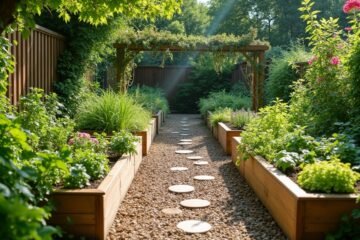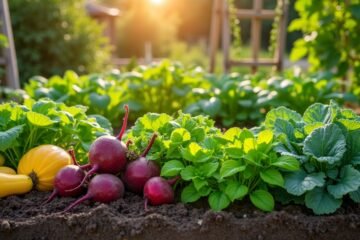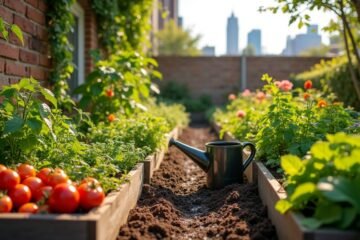For the ultimate raised bed garden, you need a fabulous soil mix! Start with 40% topsoil as your sturdy base, then mix in 30% compost for that yummy nutrient boost, and finish with 30% aeration material like perlite. This combo encourages healthy root growth and vibrant veggies. Don’t forget to check the pH too—aim for 6.0 to 7.0 for maximum flavor! Stick around to discover more secrets for an amazing garden experience!
Best Organic Soil Mix for Raised Beds
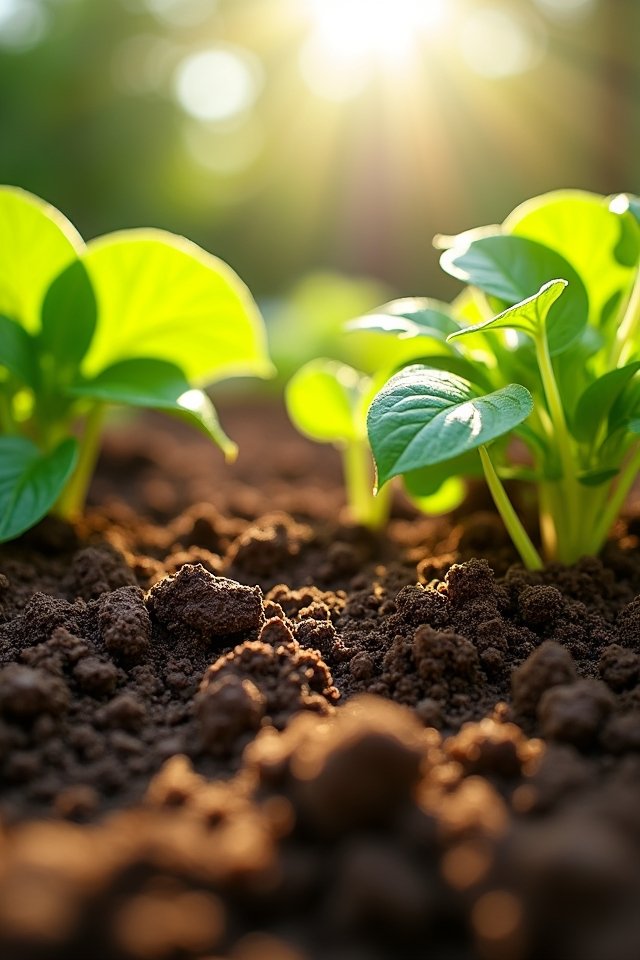
When it comes to creating the perfect organic soil mix for your raised beds, think of it as crafting a delicious recipe! You’ll want to gather a variety of compost sources that add nutrients and life! Consider kitchen scraps, yard waste, or even store-bought options like worm castings—your plants will love you for it! But wait—don’t forget soil testing; it’s like your recipe’s secret ingredient! By testing your soil, you’ll know exactly what to add or tweak. Aim for a blend of rich compost, peat moss, and vermiculite to create a fluffy, moisture-retaining concoction. Picture your plants thriving, their roots dancing in this vibrant mix. Ready to grow some veggies that would make your neighbors jealous? Let’s dig in!
Perfect Soil Ratios for Vegetables
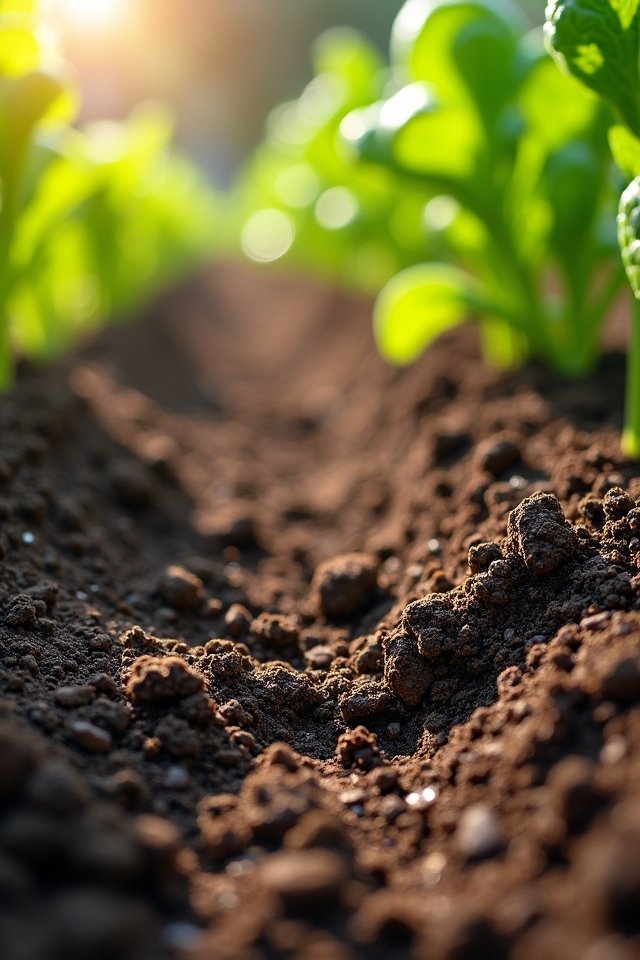
Getting the soil ratios just right is like finding that perfect seasoning for your favorite dish—it makes all the difference! Start by balancing the ingredients to guarantee your vegetables thrive. Aim for these ideal ratios:
- 40% topsoil for foundation
- 30% compost for nutrients
- 30% aeration material for drainage
Don’t forget about soil pH too; it’s vital for nutrient absorption! A sweet spot of 6.0 to 7.0 is generally what you’re after. When you’ve got the right nutrient balance, your garden becomes a vibrant ecosystem where vegetables can grow full of flavor and health. So, mix it up! You’ll feel like a culinary wizard conjuring up the garden of your dreams! Happy planting!
Fertility Boosting Ingredients
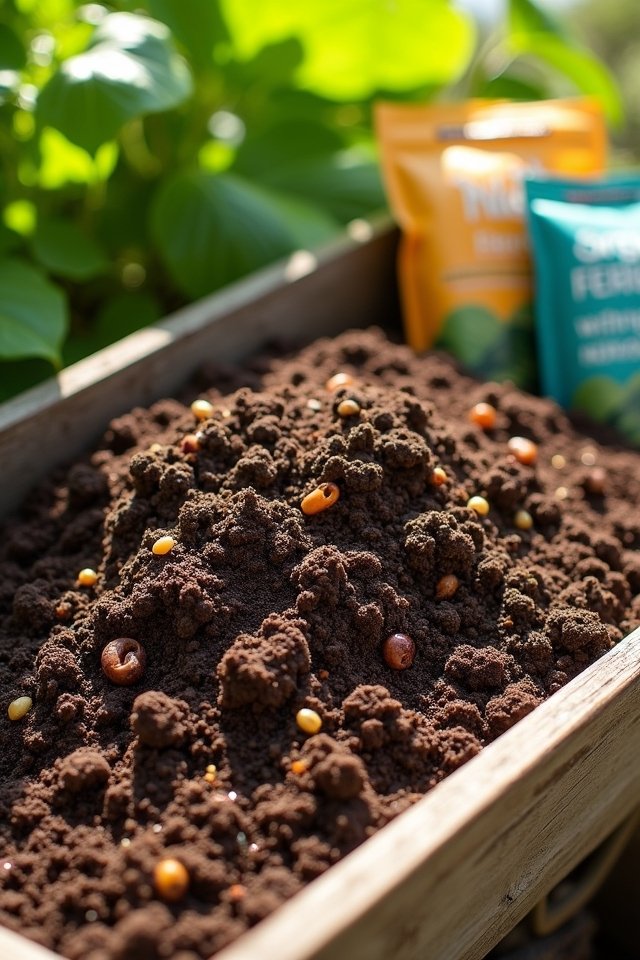
Ready to supercharge your garden? You’ll want to immerse yourself in fertility-boosting ingredients! Adding compost is a game-changer, packed with compost benefits that rev up your soil. It enriches the earth, providing a buffet of nutrients your plants crave—think of it as their favorite all-you-can-eat salad bar!
Mixing in worm castings? Absolutely, they’re like little powerhouses of magic, helping create nutrient balance. And don’t forget fish emulsion; it’s the secret sauce that’s been used for ages! Consider adding a sprinkle of kelp meal too—it’s like giving your plants a spa day!
With these innovative ingredients, your garden will thrive and produce loads of vibrant veggies. Who says gardening can’t be exciting and full of surprises? Let’s dig in!
Drainage Solutions for Raised Beds
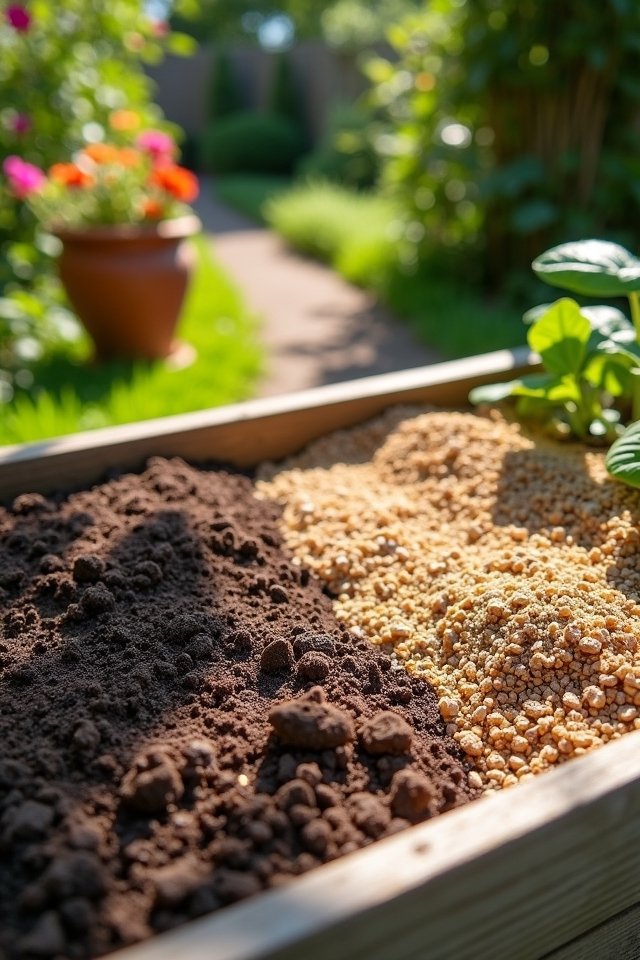
You’ve got all those fertility-boosting ingredients cooking up a storm in your soil, but let’s not forget an equally important element—drainage! You can whip up a garden masterpiece, but if water pools like an uninvited guest, your plants won’t thrive. To keep that perfect balance of moisture and air, consider using innovative drainage materials like:
- Coconut coir for excellent water retention while allowing excess water to escape.
- Perlite to boost aeration and prevent soil compaction, keeping roots happy and perky.
- Gravel or crushed stone at the bottom for a solid foundation, ensuring quick drainage.
These solutions will let your plants breathe and flourish, creating a robust environment worth celebrating! So, ready to dig in?
Seasonal Soil Amendments and Adjustments
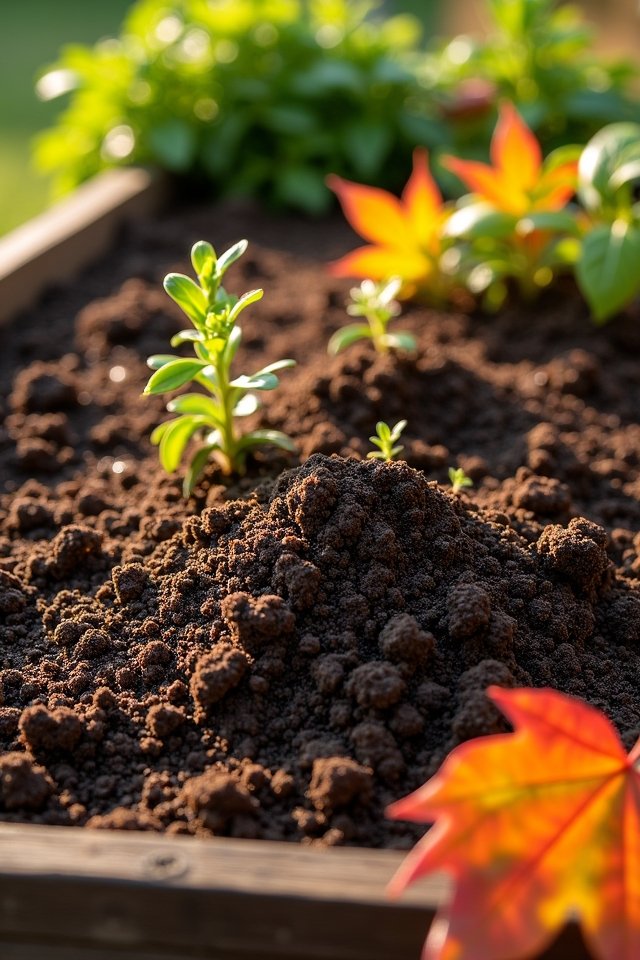
While the seasons change, so do the needs of your precious raised bed soil! You wouldn’t wear a winter coat in July, right? Similarly, your soil craves seasonal adjustments! Start with soil testing; it’s like giving your plants a health check-up. You might find your soil needs a boost of nutrients in spring, like compost or organic fertilizers, to kickstart growth. In fall, think about adding mulch or cover crops to protect against winter’s chill. What about summer? A dash of lime might help if your soil feels a bit too acidic. Accept these lively changes, and your garden will reward you with bountiful produce; after all, happy roots make happy veggies! Isn’t that a joyous cycle?
Frequently Asked Questions
Can I Use Regular Garden Soil in Raised Beds?
You might think using regular garden soil in raised beds is a quick fix, but hold on! It may lack the fluffy, well-drained structure your plants crave. Who wouldn’t want thriving veggies, right? Instead, explore garden soil alternatives like compost or vermiculite for a lively mix! These options guarantee excellent raised bed benefits, like healthier roots and better moisture retention. Your plants will thank you—imagine that lush, vibrant garden bursting with life!
How Deep Should the Soil in Raised Beds Be?
Did you know that a healthy root zone can reach depths of up to 24 inches? So, when you’re setting up your raised bed, aim for at least 12 inches of soil depth. This gives roots plenty of room to stretch, ensuring robust growth! Just imagine your tomatoes flourishing against the odds! If you want thriving veggies, this depth isn’t a suggestion—it’s a secret to success! Let those roots dive deep, and watch the magic happen!
What Is the Best Container for Mixing Soil?
When you’re mixing soil, you’ve got some fun container types to evaluate! A sturdy wheelbarrow or a large plastic tub works wonders—it’s like the mini-stage for your soil creations! You can use soil mixing tools like shovels or trowels to blend everything together, turning your mix into a vibrant concoction. Imagine the earthy aroma wafting up as you create! Got a big project? A cement mixer can transform your soil game! How exciting!
How Often Should I Replace the Soil in Raised Beds?
You should replace your soil every two to three years for ideal raised bed maintenance. Think of your soil like a well-loved pair of shoes; eventually, it loses its magic! Regularly mixing in fresh compost can refresh the nutrients in between full replacements. Don’t ignore those pesky weeds and pests, either! Keep your plants happy and thriving by checking your soil often—your green thumbs will thank you for it! Isn’t gardening exciting?
Can I Use Compost Only for Raised Bed Soil?
Sure, you can use compost only for raised beds! Just imagine your plants thriving in a rich, dark, earthy hug! Compost benefits your garden by adding nutrients and improving soil structure. However, the quality of your compost matters—if it’s too woody or not well-decomposed, your plants might feel a bit neglected. Mix in some other ingredients for balance, and your garden will be the envy of the neighborhood! Why settle for less? Happy planting!
